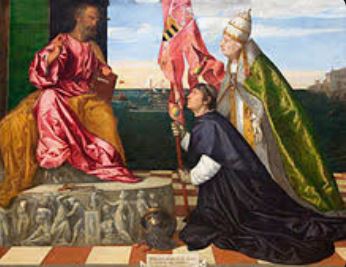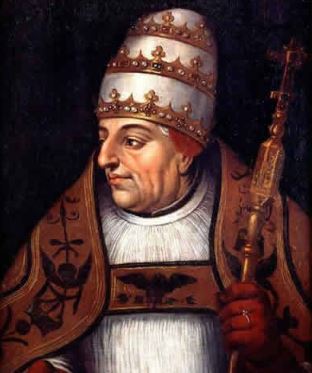Alexander VI, born Rodrigo de Borja (Borgia in Italian) on January 1, 1431, is remembered as one of the most controversial figures in the history of the papacy. Serving as Pope from 1492 until his death in 1503, his papacy was marked by political intrigue, accusations of corruption, and his deep involvement in the secular affairs of Renaissance Europe. Despite his notoriety, Alexander VI’s reign also saw significant contributions to the arts, the expansion of Christianity, and the strengthening of papal authority.
Early Life and Rise to Power
Rodrigo de Borja was born into the influential Borgia family in Xàtiva, a town near Valencia, in the Kingdom of Aragon (modern-day Spain). The Borgia family rose to prominence thanks to Rodrigo’s uncle, Alonso de Borja, who became Pope Callixtus III in 1455. Under his uncle’s patronage, Rodrigo was rapidly promoted within the Catholic Church, receiving titles and privileges that paved the way for his future as pope.
Rodrigo studied law at the University of Bologna and gained a reputation for his sharp intellect and political acumen. In 1456, he was made a cardinal, and by 1457, he was appointed vice-chancellor of the Catholic Church, a position he held for decades. This role gave him immense influence over the administration of the Church’s financial and diplomatic affairs.
Despite his clerical position, Rodrigo de Borja led a lifestyle that was anything but typical for a future pope. He fathered several children and was known for his involvement in secular politics. However, his ambition and family connections allowed him to continue rising through the ranks of the Church.
Election as Pope in 1492
Rodrigo’s ascent to the papacy was the result of intense political maneuvering. The papal conclave of 1492, which followed the death of Pope Innocent VIII, was rife with factionalism and corruption. Rodrigo, using his wealth and connections, is said to have secured his election through bribery, promising lucrative positions and rewards to key cardinals in exchange for their votes.
On August 11, 1492, Rodrigo was elected Pope, taking the name Alexander VI in honor of Alexander the Great. His election was immediately controversial, as many within the Church were appalled by the clear display of simony (the buying and selling of church offices). Nevertheless, Alexander VI wasted no time in consolidating his power and pursuing his ambitious political goals.
Family and the Borgias
Alexander VI’s papacy is inseparable from the history of the Borgia family, whose name has become synonymous with corruption, intrigue, and scandal. One of the most notable aspects of Alexander’s papacy was his blatant favoritism toward his children, whom he fathered with his long-time mistress, Vannozza dei Cattanei.
- Cesare Borgia: Perhaps the most infamous of Alexander’s children, Cesare was initially made a cardinal but later left the Church to pursue a military and political career. Alexander VI appointed Cesare as commander of the papal armies, and together, they worked to expand Borgia influence across Italy. Cesare’s ruthless tactics, including assassinations and military campaigns, made him one of the most feared figures in Renaissance Italy.
- Lucrezia Borgia: Lucrezia, Alexander’s daughter, became a pawn in the political alliances her father sought to create. She was married multiple times, each marriage designed to further Borgia interests. Although often depicted as a femme fatale in popular culture, historians debate the extent of her involvement in the more nefarious actions of her family.
- Juan Borgia: Alexander VI favored Juan, appointing him Duke of Gandía and making him captain-general of the papal forces. However, Juan’s sudden and mysterious murder in 1497 caused a significant blow to Alexander VI, who mourned his death deeply. The murder remains unsolved, but rumors of internal family strife and Cesare’s potential involvement persist to this day.
Political Intrigue and Papal Power
One of the defining features of Alexander VI’s papacy was his political ambition. He sought to strengthen the power of the papacy while simultaneously advancing the fortunes of the Borgia family. He was deeply involved in the political affairs of Italy, which at the time was divided into numerous city-states, each vying for dominance.
Alexander VI played a key role in the Italian Wars, which saw France, Spain, and various Italian powers compete for control of the Italian Peninsula. In 1494, King Charles VIII of France invaded Italy, intending to claim the Kingdom of Naples. Initially, Alexander VI attempted to appease Charles, but as the French forces advanced, he shifted his alliances, working with other Italian states to push the French out of Italy.
Through a series of shifting alliances, bribes, and military campaigns, Alexander VI successfully maintained papal authority in the face of external threats. His ability to manipulate political events allowed him to expand the territories directly controlled by the papacy, especially through the actions of his son Cesare.

The Role of the Church and Religion
Despite his involvement in secular matters, Alexander VI made significant efforts to expand the influence of the Catholic Church globally. During his reign, Christopher Columbus embarked on his second voyage to the Americas, and Alexander played a crucial role in resolving disputes between Spain and Portugal over newly discovered lands.
In 1493, Alexander issued the papal bull “Inter caetera”, which divided the world between Spain and Portugal for colonization. This decree granted Spain control over most of the Americas, while Portugal was given territories in Africa and Asia. This decision had long-lasting effects on the global political landscape and the spread of Christianity.
Alexander VI was also a patron of the arts, contributing to the cultural flourishing of the Renaissance. He commissioned numerous works of art and supported many artists of the time. His interest in art and architecture helped shape the Vatican and Rome into the cultural center of the Renaissance.
Accusations of Corruption and Immorality
Alexander VI’s papacy was one of the most scandalous in the history of the Catholic Church. His blatant nepotism, simony, and involvement in secular politics earned him widespread criticism, both during his reign and in the centuries that followed. Many within the Church were appalled by his actions, and reformers such as Savonarola, a Dominican friar in Florence, openly condemned him as corrupt and immoral.
Alexander’s personal life, particularly his relationships with his mistresses and children, was also the subject of gossip and scandal. His open favoritism toward his family, especially Cesare, further tarnished his reputation. Historians debate whether the infamous rumors about the Borgias, such as allegations of incest and poisoning, were true or exaggerated by their enemies.
Despite the controversies, Alexander VI was an effective political leader, managing to maintain control of the papacy during a tumultuous time in European history.
The Death of Alexander VI
Alexander VI died on August 18, 1503, at the age of 72. His death came after a brief illness, and his sudden demise sparked rumors of poisoning, although it is more likely that he succumbed to
malaria, a common disease in Rome during that period. The circumstances surrounding his death remain shrouded in mystery, with some speculating that political enemies may have been involved. However, there is no concrete evidence to support these claims.
After his death, Alexander VI’s body was initially buried in St. Peter’s Basilica, but due to the negative sentiment surrounding his papacy, his remains were later moved to the Church of Santa Maria in Monserrato degli Spagnoli in Rome.
Legacy of Alexander VI
The legacy of Pope Alexander VI is one of intense debate and contradiction. On one hand, he was an ambitious and shrewd political figure who strengthened the papacy’s temporal power and expanded its territories. His efforts to consolidate the papal states and manage international relations between emerging global powers, such as Spain and Portugal, shaped the geopolitical landscape of the 16th century.
On the other hand, his papacy is widely regarded as one of the most corrupt in the history of the Church. His nepotism, favoring of his children, and involvement in secular conflicts undermined the spiritual authority of the papacy. The accusations of simony, bribery, and personal immorality associated with Alexander VI damaged the reputation of the Catholic Church and contributed to growing calls for reform.
Alexander VI’s controversial reign played a role in the conditions that would eventually lead to the Protestant Reformation, a movement that sought to address the corruption and abuses within the Catholic Church. Figures like Martin Luther would later cite the excesses of the papacy during the Renaissance, including Alexander VI’s behavior, as examples of why reform was necessary.
Despite the controversies, Alexander VI was a significant patron of the arts and played a key role in the cultural developments of the Renaissance. Under his papacy, Rome became a thriving center of artistic and architectural innovation. The Borgias’ legacy also continues to captivate popular imagination, inspiring numerous books, films, and television series.
Key Achievements of Alexander VI
- Expansion of Papal Territories: Through the military campaigns led by his son Cesare Borgia, Alexander VI expanded the lands controlled by the papacy, strengthening its temporal power.
- Resolution of Colonial Disputes: Alexander’s papal bulls, particularly “Inter caetera,” played a critical role in dividing the newly discovered territories between Spain and Portugal, influencing the course of global colonization.
- Patron of the Arts: Despite his controversial personal life, Alexander VI was a notable patron of the arts, contributing to the cultural growth of the Renaissance in Rome.
- Political Leadership: His diplomatic and political maneuvers helped maintain papal influence in the constantly shifting alliances of Renaissance Italy.
A Complex and Divisive Figure
Pope Alexander VI was a complex figure whose papacy left an indelible mark on both the Catholic Church and the political landscape of Renaissance Europe. His ambition and political savvy helped to maintain the authority of the papacy during a time of upheaval, but his methods often involved moral compromises that undermined the spiritual role of the Church.
The Borgia name, largely shaped by the actions of Alexander VI and his children, remains synonymous with corruption, scandal, and intrigue. Yet, his papacy also contributed to the flourishing of the arts and global expansion of Christianity.
While he is remembered as one of the most controversial popes in history, his reign offers a glimpse into the complex world of Renaissance politics, where the lines between religious authority and secular power were often blurred.




